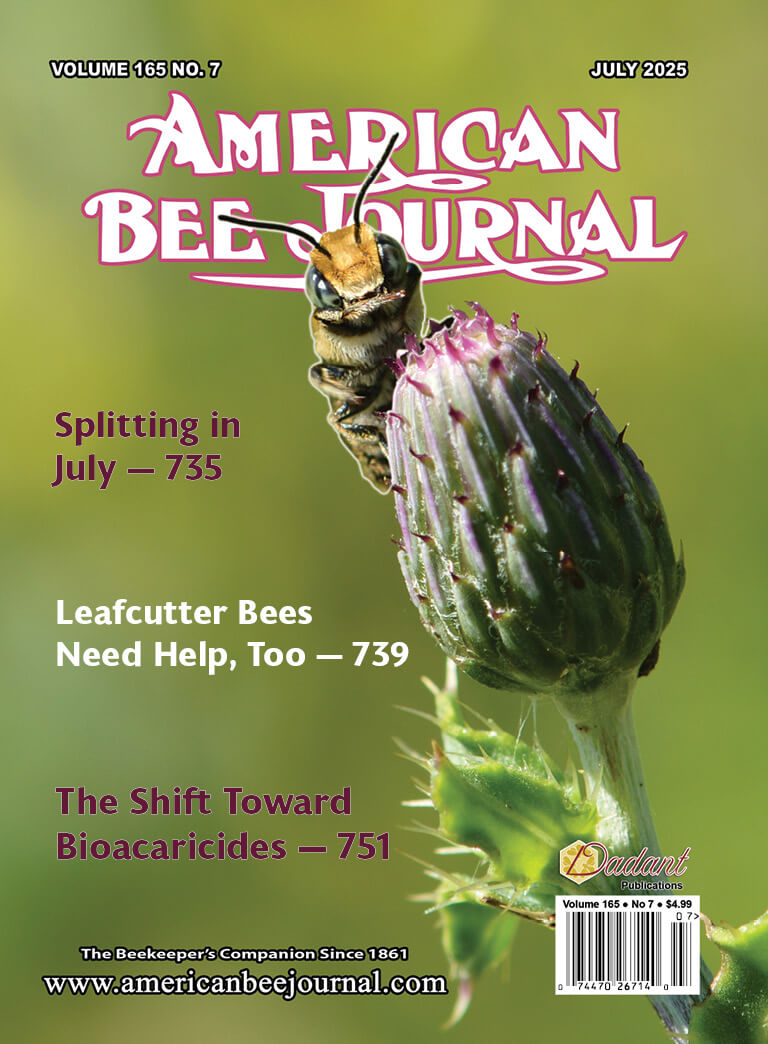
Q Fermented Honey
We have a few pails of fall-extracted honey from a couple of years ago that has fermented. Is it safe to feed to the bees?
John Hotchkiss
Ontario, March
A
The general rule of thumb is not to feed fermented honey to bees. It is said to cause dysentery in the bees. Thus, I do not recommend feeding it to them. Perhaps the next question is “Then, what can I do with it?” Many honey packers have the ability to run it through a type of honey dehydration process. This will evaporate off the alcohol and reduce the water content in the honey. The taste may be permanently altered by the original fermentation, but this can at least remove the alcohol taste and make it less prone to future fermentation. If you are not a commercial beekeeper, you might consider checking with some in your area to see if any own a honey drier. With the low volume you have, it may not be worth the trouble. If you only have a few pails of the honey and cannot find a use for it, you may just have to cut your losses and toss it.
Q Beekeepers Helping Researchers
Given how much researchers help beekeepers, how can beekeepers help researchers in their work? I’m wondering about the whole range of involvement, from donating money or answering surveys all the way up to hosting hives or assisting with experiments.
Calvin Hirschy
Virginia, March
A
These are some pretty unique questions that I do not get asked a lot (well, much at all). I will say that it is imperative that beekeepers and scientists (and other groups for that matter) work collaboratively to address the issues plaguing the industry. There are many examples of great interactions between scientists and beekeepers. I have been privy to those myself. However, I have also seen too many instances of negative interactions between beekeepers and scientists even though we all want the same thing: healthy honey bees and a productive industry. I am grateful you see this the way you do! There are certainly things beekeepers can do to help.
First, beekeepers can support scientists by telling them clearly (but politely ☺) what needs they have as an industry. This can be done by direct emails or calls to the scientist. However, it is even better done through larger groups such as the state and national beekeeper associations. Why is it better this way? As a scientist on the receiving end of those emails, phone calls, visits to the lab, etc., I have to remember that I serve an industry … not an individual. Thus, it is best to find out what the industry needs. Otherwise, we can spend all of our time chasing the personal whims of individual beekeepers rather than the industry as a whole. Beekeeper organizations can work with scientists to survey their membership, conduct listening sessions, etc., to get a pulse for what the greater industry needs.
One piece of advice that is always helpful: Do not tell your local scientist what you do not want (which is what usually happens), but what you do want. Offer solutions, not roadblocks. Your point about surveys is great! You should always consider answering beekeeping/beekeeper-related surveys. Scientists try to get valuable information this way. For example, we surveyed commercial beekeepers in Florida two years ago, asking them what projects they wanted us to do. Many beekeepers responded. We were able to use the survey data to develop projects to address the needs of the commercial industry in the state. My team and I have been working on what they asked us to do.
Next, beekeepers can formulate a plan to help scientists directly. Think of this as having skin in the game. This can be financially, as you note. It takes lots of money to conduct the research beekeepers need (way more money than most beekeepers realize). As a scientist, it does me no good to know what to do if I cannot afford to do it. Lots and lots of beekeepers donate money to research laboratories, programs, etc. This is very welcome and certainly helps move projects forward. However, beekeepers can also donate “in kind” support. They do this by donating equipment, loaning hives for research, volunteering to assist with the work, etc. These are GREAT ways to help scientists, especially given that scientists are often cash- and resource-strapped (not to mention time-strapped!).
Third, be an advocate, not an antagonist, of your local scientist’s program. Just to give some personal examples: The Florida State Beekeepers Association, various local bee clubs, and numerous individual beekeepers have been wonderful advocates of my program at the University of Florida. They worked with the state legislature, the University, and other groups to fund a new bee lab at UF. They advocated for equipment, support, financial resources, and a lot more. My program has benefited directly from the wonderful beekeepers who continue to advocate for what we do. In return, I am able to engage in more extension, research, and teaching programming on behalf of beekeepers. Admittedly, I have also had the difficulty of experiencing antagonists in my job. This has never led to greater productivity.
Fourth, have realistic expectations of what scientists can/cannot address. Most of the misunderstandings I have with beekeepers come from beekeeper expectations that cannot be met. I have a story that illustrates this. A group once donated just over $5,000 to my program. I used the money to conduct a Varroa project. Some beekeepers felt that I should have been able to solve the entire Varroa problem for that amount of money, stating proudly that they would have been able to do it had they received the funds. Ultimately, they had unrealistic expectations that could never be met. I always tell folks that with enough time, money, and personnel, I can solve any problem the industry has. (Incidentally, I believe that statement fully!) Unfortunately, the industry often expects scientists to solve all the problems, but without any of the resources or support. Temper your expectations and help the scientists build a strategic roadmap to address industry need. Then, help them walk down the road you just mapped!
Finally, consider being part of an industry advisory panel for your local honey bee scientist. We have tried to do that different ways at UF. We mostly do this by working with the Florida State Beekeepers Association Research Committee, the Florida Farm Bureau Apiary Advisory Committee, Florida’s Honey Bee Technical Council, etc. These are incredibly useful partnerships because we can …


